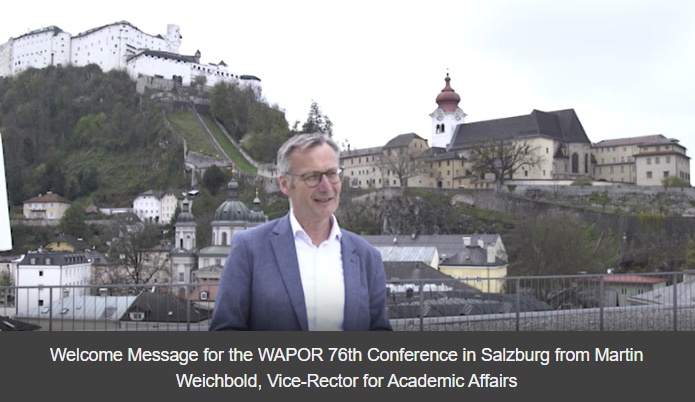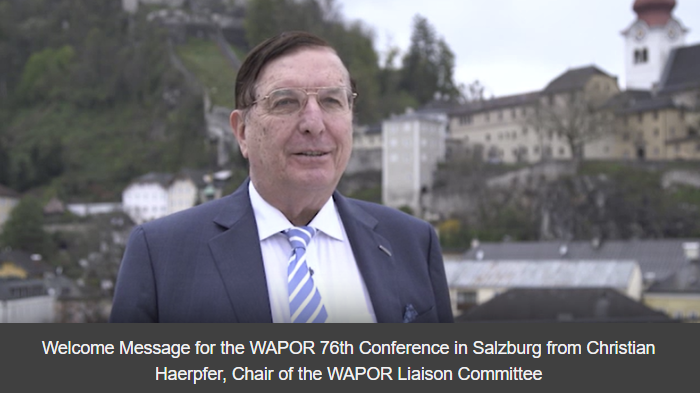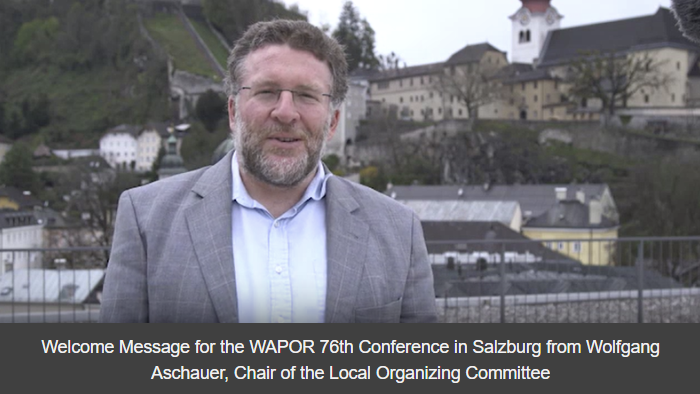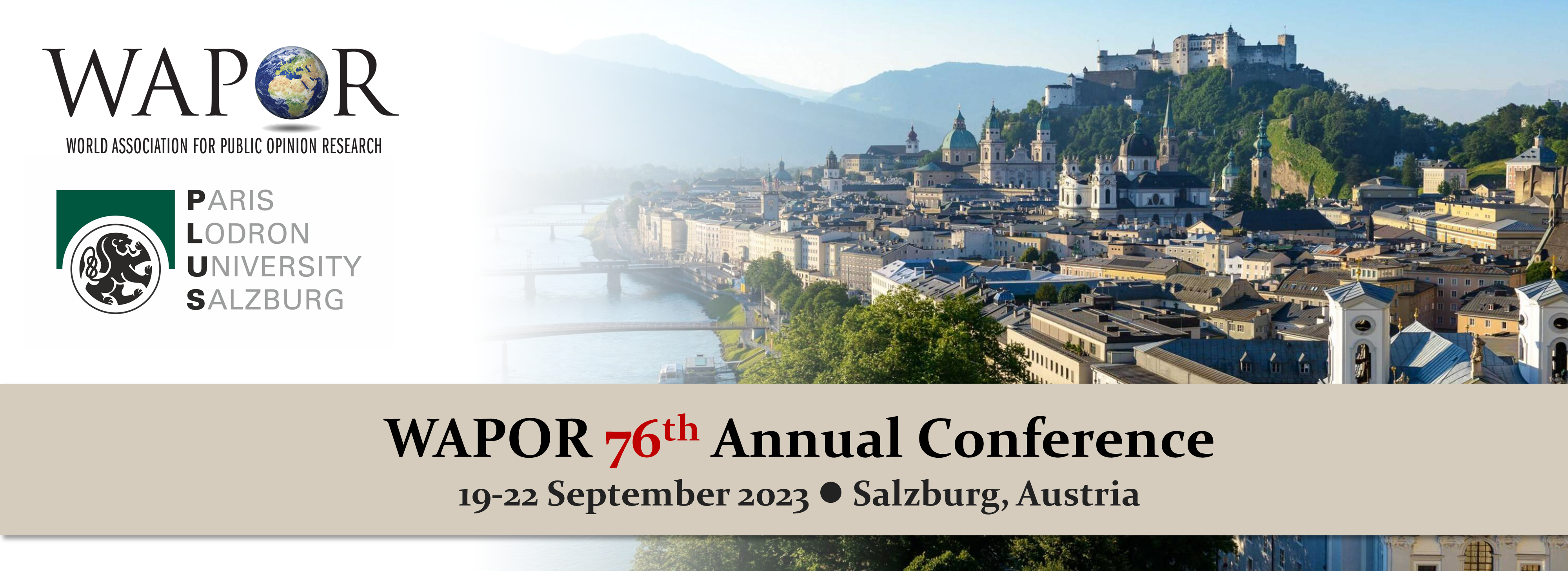
WAPOR 76th Annual Conference
19-22 September 2023 ● Salzburg, Austria
The WAPOR 76th Annual Conference took place on September 19-22, 2023 in Salzburg, Austria. This year’s WAPOR annual meeting was hosted and co-organized by the Paris Lodron University of Salzburg. The 2023 conference was conducted in person. The event was hosted by the Department of Sociology and Social Geography, with the preparations led by the Local Conference Chair Prof. Wolfgang Aschauer and WAPOR Conference Chair Prof. Holli Semetko (Emory University, USA).
WAPOR 2023 Program Final
Conference Theme: Public Opinion Research in a Technology-Driven World
Although the availability of internet access remains far from adequate in many low-income countries around the world, internet technologies have transformed the practice of politics and commerce in the societies in which they are used, with consumers, candidates, parties and politicians interacting online. Affordances (such as sharing, liking, commenting, and a range of emotions) provided by social media platforms provide massive amounts of data for research on public engagement with information online. Misinformation — false information and fake news especially in the context of disasters, crises and elections — remain a problem online and off in many countries. The internet is just one example of a technology driving commerce and social change. Next to sea level rise and climate change mitigation, artificial intelligence (AI) and quantum computing present the greatest challenges to global governance.
Given the challenges and opportunities for society presented by rapidly accelerating technologies, what does the latest public opinion research tell us about the issues of importance today? What can we learn from public opinion and elite opinion over time? What are the latest developments in public opinion research, misinformation, and the study of campaigning and voting behavior? What threats do non-probability samples and AI pose to public opinion research and election forecasting? What are the challenges and opportunities in big data analytics — topic modeling, sentiment scoring, image analysis?
The 2023 conference theme is broad. It includes many newer topics relevant to public opinion research including e-voting, e-deliberation, e-panels, mixed mode studies, AI, social media research and methods, technologies and the UN’s sustainable development goals, as well as longstanding ‘classical’ public opinion research topics of importance such as electoral studies, freedom to publish polls, the quality of public opinion research around the world, traditional media research, and more.
The upcoming conference presentations, posters, and panels will include topics related to substantive public opinion research and survey methodology, including qualitative methods. Examples of topics include, but are not limited to:
- Public opinion and public diplomacy
- Public opinion, policymaking and survey research
- Public opinion, elections and voting
- Political behavior, participation and culture in survey research
- New sources of information on public opinion and the use of social media
- Public opinion and misinformation
- Artificial Intelligence (AI) challenges in public opinion research and survey methods
- Public opinion and virtual reality
- News, media, journalism and public opinion
- Advertising Online, Media and Audience Research
- Digitalization and new sources of information in survey research
- Survey research applications
- E-voting, e-deliberation, e-panels
- Comparative research and International Survey Projects
- Cross-cultural concerns in data collection and measurement issues
- Big data, sentiment analysis and machine learning
- Data visualization, new technologies and online surveys
- Best practices for stakeholder research and expert surveys
- Panel, longitudinal and national monitoring surveys in policymaking
- Methodological challenges and improvements in the areas of sampling, measurement, survey design and survey response or non-response
- Qualitative research
Key-note speakers
- Claes H. de Vreese is University Professor of Artificial Intelligence and Society (2021-), with a special focus on media and democracy at the University of Amsterdam. He holds the Chair in political communication at the Amsterdam School of Communication Research ASCoR. He (co-)directs the UvA Platform Information, Communication and the Data Society (ICDS), including the Research Priority Areas Communication, Personalised Communication, and Human(e) AI. He is the founding Director of the Center for Politics and Communication (www.polcomm.org). He is also Chair of Social Sciences in the Danish Institute for Advanced Studies DIAS and founding, incoming (2021) Scientific Director of the Digital Democracy Center at the University of Southern Denmark. He is member of the ICA Executive Committee and served as President 2020-21. In his keynote lecture “Artificial opinions? AI, politics, and public opinion“, Claes de Vreese will explore the implications of changes in artificial intelligence for public opinion research, the changing political landscape of AI, and the evolving nature public opinion about AI.
- Frauke Kreuter is the Chair of Statistics and Data Science at LMU Munich, Germany and at the University of Maryland, USA, she is Co-director of the Social Data Science Center (SoDa) and faculty member in the Joint Program in Survey Methodology (JPSM). She is an elected fellow of the American Statistical Association, and received the Warren Mitofsky Innovators Award of the American Association for Public Opinion Research in 2020. In addition to her academic work, Professor Kreuter is the Founder of the International Program for Survey and Data Science (IPSDS), developed in response to the increasing demand from researchers and practitioners for the appropriate methods and right tools to face a changing data environment; Co-Founder of the Coleridge Initiative, whose goal is to accelerate data-driven research and policy around human beings and their interactions for program management, policy development, and scholarly purposes by enabling efficient, effective, and secure access to sensitive data about society and the economy; and Co-Founder of the German language podcast Dig Deep. In her key-note lecture “Leveraging AI for Survey Research“, Frauke Kreuter scrutinizes the transformative potential of Large Language Models (LLMs) in survey research, focusing on three critical areas: questionnaire design, synthetic data creation, and their role as qualitative interviewers. In the domain of questionnaire design, the lecture delves into if and how LLMs can construct contextually accurate and highly effective survey items. However, there are valid concerns about the model’s understanding and potential biases, which we will critically evaluate. She also discusses LLMs’ ability to fabricate synthetic data, preserving core statistical properties whilst ensuring privacy. Here too, the ethical implications and the potential for misuse of this capability pose challenges that need to be addressed. Lastly, the lecture explores how LLMs, with their human-like conversational ability, can act as qualitative interviewers, allowing in-depth information gathering at scale. Yet, questions about their ability to fully capture the complexity and subtleties of human interaction and response also remain. With a balance of theory and practical examples, we aim to stimulate new ideas, encouraging researchers to leverage the power of AI and LLMs to elevate their research strategies.
- Reinhard Heinisch is Professor of comparative Austrian politics and head of the Department of Political Science and Sociology at Paris Lodron University of Salzburg. His research and teaching focuses on questions of democracy, comparative populism, Euroscepticism and the behavior of political parties. His research has appeared in over 60 publications, including leading international journals such as the Party Politics, West European Politics, Democratization, Comparative European Politics and many others. He is author and editor of 8 books including The People and the Nation: Populism and Ethno-Territorial Politics in Europe (Routledge 2019). He has served as a consultant to various organizations and government agencies, including the U.S. Department of State, the Austrian Federal Ministry of Defense, and The Salzburg Global Seminar. Heinisch is the recipient of the Austrian National Prize for Science by the Lupac Foundation of the Austrian Parliament. He has directed several research projects and serves currently as the team leader of an EU funded Horizon2020 project, “PaCE” to study the rise of populist politics. In his keynote lecture “Sentiment and Conspiracy. An Empirical Journey into the Postfactual World of Ideas of the New Populism”, based on years of research on populism, political parties, and voting behavior as well as in reference to a project financed by the Swiss and Austrian Science Funds, Reinhard Heinisch explores the political aspects of conspiracy theories. The talk addresses the effort to identify political causes and consequences in addition to psychological and communicative factors. Reclaiming the political and thus collective dimension of conspiracy theories is important to understand how they affect political debates about public health, climate change, and immigration. The presentation will provide an overview of current political science perspectives and conceptualizations of conspiracy theories and conspiracy mentality and will also offer the initial results of a comparative European survey.
Paper Awards
Naomi C. Turner Award
The Naomi C. Turner Prize is awarded for best graduate student paper presented at our annual conference. This prize was endowed by WAPOR past president Fred Turner in memory of his mother. Fred was president of WAPOR in 1989-1990. A special thank you goes to the 2023 Turner Prize committee, including Mark Gill, Christopher Adams, Cornelia Mothes, Thomas Roessing, and Matthew Barnidge. The committee is pleased to announce the winner of the 2023 Naomi Turner prize is Daniel Casey for his paper “Democratic responsiveness to different forms of public opinion”. Daniel’s research takes an innovative approach to understanding public opinion pressure on political leaders through the analysis of letters received by the Australian Prime Minister John Howard. The committee was impressed by the novelty and scale of this research, including the analysis of over 400,000 letters to PM Howard against over 2,000 media appearances by the Prime Minister between March 1996 and December 2000 (equating to more than 6 million words). The author also obtained interviews with the former Prime Minister and other senior officials. Together this data and approach forms the basis for more research and analysis, and the committee believes these types of innovative studies deserve to be showcased.
Elizabeth H. Nelson Award
The Elizabeth H. Nelson Prize is awarded for best conference paper from a society in transition. This prize was endowed by WAPOR past president Elizabeth Nelson who was president of WAPOR from 1991-1992. Thank you to our review committee members for the Nelson Prize – Constanza Cilley, Michael Nitsche, Rico Neumann, Saidul Haq and Eva Aizpurua. This year’s Nelson Prize goes to Nataliya Reshetova at the Ukrainian Catholic University of Lviv for her paper “Support for Democracy in Ukraine: The Reinforcing Effect of Critical Junctures.” Her paper assesses the growth of democracy support in Ukraine over the past two decades, focusing on the role of geography and language in shaping people’s national identity. Employing secondary quantitative data from the World Values Survey, European Values Study and European Social Survey, and using descriptive and inferential statistics, Nataliya finds that support for democracy increased more in the country’s Eastern regions due to the reinforcement of national identity following the 2014 Russian military aggression in the Donbas and the annexation of Crimea. They also highlight a positive relationship between the use of the Ukrainian language and support for democracy as part of national identity consolidation. The award committee appreciates the authors’ dataset selection and integration as well as hypothesis testing efforts, noting the paper’s clarity and relevance to current issues.
Janet Harkness Award
WAPOR expresses our gratitude to the members of the Janet Harkness Student Paper Award Committee. These include Chan Hoong Leong, Henning Silber, Sunghee Lee, Heather Smalley, Ana Villar and Mariano Torcal. After considerable debate, the committee decided not to present an award this year. That was a difficult decision and we recognize and appreciate the time and effort invested by members of this award committee.
Alexis de Tocqueville Award
De Tocqueville, of course, is best known for his book “On Democracy in America.” Although the book was based in part on his travels through the United States in the early 19th century, it is believed one of the main goals of the work was to help the people of France get a better understanding of their position between a fading aristocratic order and an emerging democratic order. He saw democracy as an equation that balanced liberty and equality, concern for the individual and as well as for the community. Given the ongoing relevance of his observations, this award is given annually to a paper presented at the WAPOR conference that is concerned with democracy and public opinion in the world, whether in consolidated or in emerging democracies. I would like to thank former WAPOR Presidents Claire Durand, Marita Carballo, Kathy Frankovic, Alejandro Moreno and current President Rober Chung, who served with me on the selection committee for this year’s Award. The 2023 award goes to Bernardo Mackenna, Ricardo Gonzalez, Adolfo Fuentes, and Esteban Munoz for their paper “Breaking The Populist Spell: A Comparative Study of The Association Between Interpersonal Ties and Populist Preferences”. This paper examines the relationship between social ties across socioeconomic groups and populism at the individual-level using cross-national data from the 2017 ISSP (International Social Survey Programme) study on Social Networks and Resources, and the 2021 Chilean sample of the CNEP survey. Analyses revealed that having higher status ties correlates with lower acceptance of populist politics. This association is subsequently found to be mediated by interpersonal network status, supporting the claims of Alexis de Tocqueville and William Kornhauser regarding the role of interpersonal interactions in buffering citizens from the allures of populism.
Robert M. Worcester Award
The esteemed Robert M. Worcester Prize is given annually to an outstanding paper published in the International Journal of Public Opinion Research. Thank you to the award committee, including Tom Smith, Paulina Tabery, Jibum Kim, Anna Andreenkova, Constanza Cilley and Robert Worcester as ex officio member. The recipients of the 2022 Worcester Award is Matthew DeBell of Stanford University for his paper “Measuring Political Knowledge and Not Search Proficiency in Online Surveys.” The award committee comments that, with the rise of online surveys, it becomes crucial to address the issue of respondents’ cheating on political knowledge questions on online data collection mode. This paper tackles this problem using survey experiments with multiple datasets. This research has the potential to generate greater interest in knowledge questions within the realm of online surveys and advances effective ways of addressing this issue. It is also extremely well written – structured, precise, consequential, and presents clear hypotheses, arguments, and conclusions.
Sir Robert Worcester sends his greetings to the 2023 Award Recipient.
WAPOR Service Award
WAPOR Service Award is given to honour voluntary translators who have helped WAPOR to translate its key documents into different languages so they can be more easily communicated with our membership. This award is allocated by the WAPOR Executive Council following the recommendation of the Secretariat. This year’s recipients are Marita Carballo and Anastasia Saponova.
Helen Dinerman Award
This award, given since 1981, honors particularly significant contributions to survey research methodology. The award, presented annually to an individual or individuals, is in memory of Helen Dinerman’s scientific achievements over three decades of public opinion research. Recent recipients of the award include Takashi Inoguchi, Mitchell Seligson, Juan Díez Nicolás, Michael Traugott, and Christian Haerpfer.
A special thank you to this year’s review committee, including Juan Diez Nicolas, Michael Traugott, Christian Haerpfer, Takashi Inoguchi and Patricia Moy. This year, we have two Dinerman Award recipients.
The first of these is Professor Hans-Dieter Klingemann for his lifetime contributions to the furtherance of survey and public opinion research. Among these accomplishments, he was the Founder and Director of the Paul-Larzarsfeld-Gesellschaft in Germany. He was also one of the founders of academic survey research in post-Communist Europe and post-Soviet Eurasia, training and establishing survey companies and academic survey research institutes in Hungary, Czech Republic, Slovakia, Poland, and in Baltic and Balkans countries. In addition, Dr. Klingemann also made critical leadership contributions to several international comparative social science research projects, including several waves of the World Values Survey and the Comparative Study of Electoral Systems. For his leadership and extraordinary accomplishments, and for his continuous and wide-ranging impact, WAPOR is proud to honor Dr. Hans-Dieter Klingemann with the 2023 WAPOR Helen Dinerman Award.
This year we also recognize with the Dinerman Award Professor Daniel Kahneman, who’s research on the psychology of judgment and decision-making has illuminated the substantive and methodological study of how individuals think, feel, and engage with the world around them. His distinguished contributions have challenged assumptions about human rationality and, by extension, assumptions about the logic of underlying research on public opinion. His work has sparked thousands of studies and garnered more than half a million academic citations. For his thought leadership and all his extraordinary accomplishments, and for his continuous and wide-ranging impact, WAPOR is also proud to honor Dr. Daniel Kahneman with the 2023 WAPOR Helen Dinerman Award.
Sponsorship
WAPOR expresses our sincere gratitude to 16 sponsors who support the 76th annual conference.
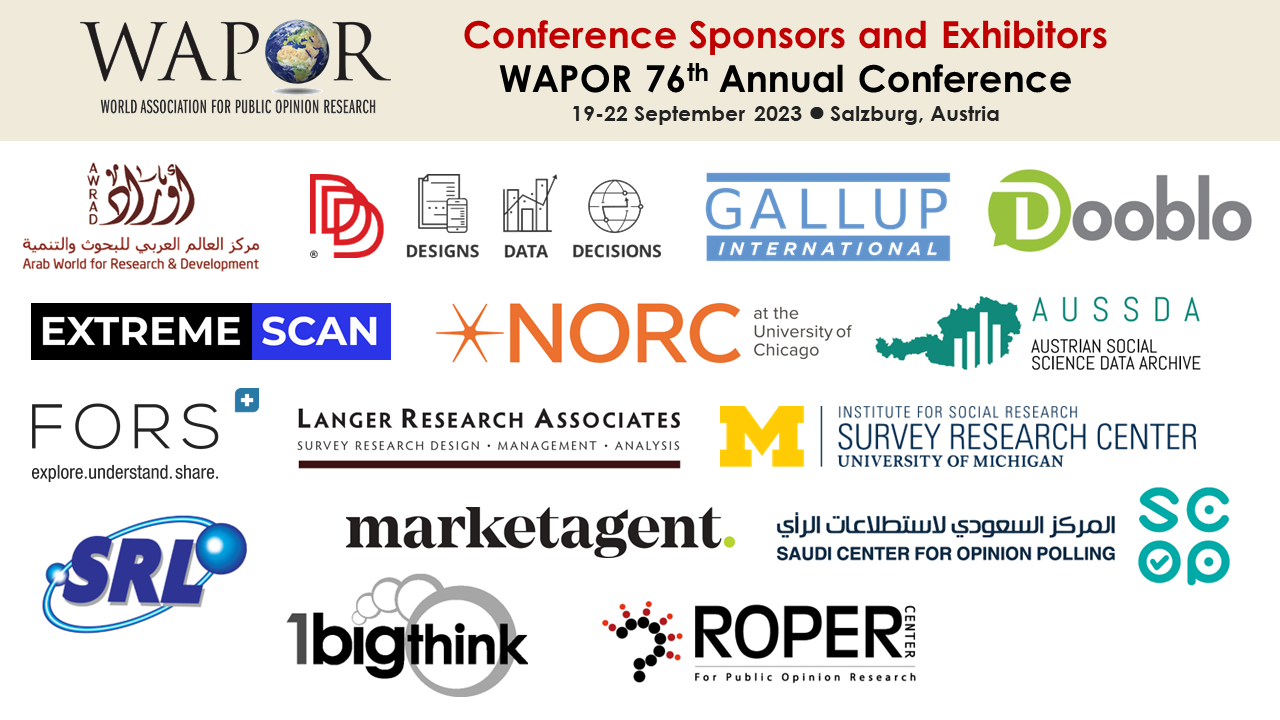
WAPOR Conference Committee 2023
Chair: Holli Semetko, Emory University, USA
Members:
- Wolfgang Aschauer, Paris Lodron University Salzburg, Austria
- Susan Banducci, University of Exeter, UK
- Asaph Young Chun, Seoul National University, South Korea
- Yashwant Deshmukh, C-Voter, India/ UAE
- Timothy Johnson, NORC at the University of Chicago, USA
- Kseniya Kizilova, Executive Director of WAPOR, Austria
Conference venue: University of Salzburg – UniPark Nonntal at Erzabt-Klotz-Straße 1, 5020 Salzburg.



